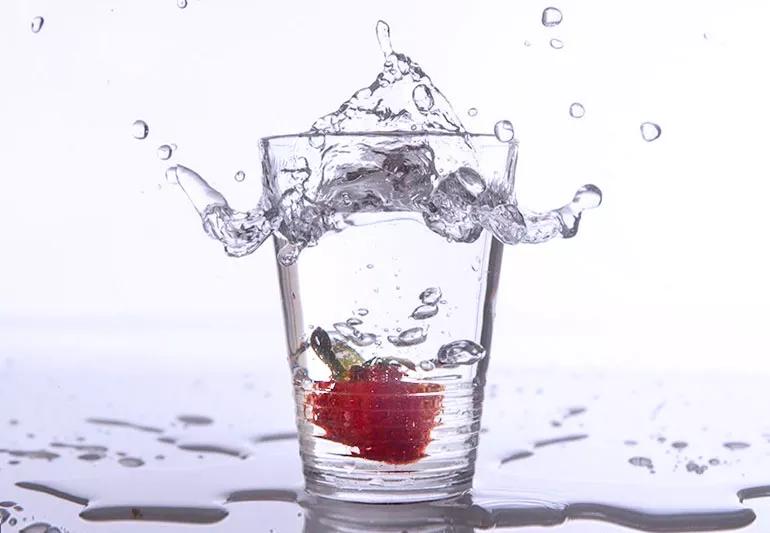Factors like your diet and physical activity can affect how much you’ll need to consume

Image content: This image is available to view online.
View image online (https://assets.clevelandclinic.org/transform/eab11134-8362-463b-ab00-52068043881c/waterStrawberry-ST-040820-770x533-1_jpg)
water with a strawberry in it
Water may not be the most exciting beverage in a world of iced mocha cappuccinos and matcha teas, but you literally can’t live without it. So how much water should you drink a day? Well, let’s dive into some numbers.
Advertisement
Cleveland Clinic is a non-profit academic medical center. Advertising on our site helps support our mission. We do not endorse non-Cleveland Clinic products or services. Policy
The National Academies of Science, Engineering and Medicine recommends the following for daily fluid intake:
Here’s the thing, though: Consider those numbers a starting point.
“Your size, metabolism, location, diet, physical activity and health all factor into how much water you need,” says preventive medicine specialist Roxanne B. Sukol, MD.
And the fluid you consume doesn’t all come out of a glass. You can expect about 20% of your daily fluid intake to come from water that’s in food.
That’s a lot of information to gulp down all at once, right? Well, here’s a drip-by-drip accounting.
So how much water should you drink in a day? We’ve all heard that 8 glasses is the ideal. But there’s no scientific evidence that drinking 8 glasses of water is necessary.
To determine how much water you need, Dr. Sukol suggests considering these four factors:
Advertisement
But water demands are also like the stock market, with daily fluctuations that depend on:
Water is sometimes considered a fourth macronutrient, joining the list with protein, fats and carbohydrates. It’s required for your body to function optimally. (Fast fact: Your body is 60% water.)
“That’s why you need to make sure that you’re drinking enough water,” explains Dr. Sukol. “It’s also why people who are too sick to drink tend to get into further trouble.”
Drinking water can help your:
There’s also research that consuming water may boost exercise performance, help with weight loss and reduce allergy and asthma symptoms.
Even if you’re not thirsty, don’t assume you’re drinking enough water. Instead, take a peek at your urine, says Dr. Sukol. If it’s a pale-yellow color, you’re right on track. If your urine is darker or has a strong odor, then you could probably use more fluids.
Other symptoms of mild to moderate dehydration might include:
Advertisement
More severe dehydration constitutes a medical emergency that requires immediate attention. Severe dehydration can include the above symptoms as well as:
If you’re still thinking, how much water should I drink? it’s important to know that many of the foods you eat contain water. Some foods that are heavy on the water content include:
When it comes to other drinks, you can include milk, tea, coffee and juices and sports drinks (though watch out for all that added sugar).
So how much water is too much?
Drinking too much water is a hard to do — but it’s possible. Hyponatremia, or low sodium, can be caused by several things — but one of them is when people drink too much water over a relatively short period of time.
“This condition can be quite serious but it is extremely rare,” says Dr. Sukol. “It’s pretty unusual that anyone would drink so much water that they would actually hurt themselves.”
The bottom line? When you consider how much water to drink a day, a good piece of advice is to focus on drinking water throughout the day. Opt for a reusable water bottle and consider adding fruit or water enhancers.
Advertisement
Advertisement

Sign up for our Health Essentials emails for expert guidance on nutrition, fitness, sleep, skin care and more.
Learn more about our editorial process.
Advertisement
Your home’s tap water should be safe to drink, but you can install filters and run tests to be sure
If you can’t bear the standard stuff, TikTok’s ‘water recipes’ may be appealing
Whatever you think it’s doing, your body is already doing on its own
Factors like your diet and physical activity can affect how much you’ll need to consume
It all depends on your ideal temperature
Find out which water option is healthier
Flying can cause dehydration and bloating and make you feel tired and stressed
Body changes put older adults at increased risk of dehydration
Type 2 diabetes isn’t inevitable with these dietary changes
Applying a hot or cold compress can help with pain
Pump up your iron intake with foods like tuna, tofu and turkey